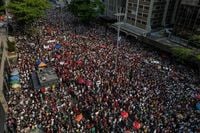On September 21, 2025, the streets of Brazil’s major cities erupted in a wave of protest, as tens of thousands of citizens rallied against what they see as a brazen attempt by lawmakers to shield themselves—and former president Jair Bolsonaro—from accountability. The nationwide demonstrations, which unfolded in Rio de Janeiro, São Paulo, Brasília, and beyond, marked the largest left-leaning turnout since President Luiz Inácio Lula da Silva’s razor-thin re-election victory in 2022, according to estimates by the Political Debate Monitor at the University of São Paulo.
The catalyst for this outpouring of dissent was a pair of controversial bills pushed through Brazil’s conservative-dominated lower house of Congress in the wake of Bolsonaro’s dramatic conviction. Just last week, the former president—a far-right populist who lost the 2022 election to Lula—received a 27-year prison sentence for plotting a coup to overturn his defeat. The conviction, a first in Brazil’s modern history for a leader accused of such a plot, sent shockwaves through the nation’s still-young democracy.
Yet, within days of the verdict, legislators fast-tracked an amnesty bill that could wipe the slate clean for Bolsonaro and hundreds of his supporters. The bill specifically targets those convicted for storming government buildings in January 2023, an event that took place just a week after Lula’s inauguration. Critics argue the amnesty push is a thinly veiled effort to protect not only Bolsonaro but also the lawmakers themselves, some of whom face their own legal troubles.
Alongside the amnesty proposal, Congress passed what protesters have dubbed the “Banditry Bill” or “Shielding Bill”—a constitutional amendment requiring a secret ballot in Congress before any lawmaker can be charged or arrested. According to FRANCE 24, House Speaker Hugo Motta defended the bill as a safeguard against judicial overreach. “This protection they seek is to camouflage corruption, impunity,” said Giovana Araujo, a 27-year-old psychology student, as she joined a “musical protest” on Rio’s Copacabana beach.
The symbolism of the protests was impossible to miss. In São Paulo, demonstrators unfurled a massive 15-meter Brazilian flag emblazoned with “No Amnesty,” a direct riposte to the pro-Bolsonaro rally weeks earlier, where a giant U.S. flag was displayed in support of the former president’s American ally, Donald Trump. “Brazil belongs to Brazilians. I came to defend democracy, stand against extremism, and say no to immunity and amnesty for coup plotters,” declared Scarlett Angelotti, a 62-year-old educator, her voice nearly drowned out by chants of “Bolsonaro in jail” and “No amnesty!”
The cultural resonance of the day was amplified by the presence of legendary musicians Caetano Veloso, Gilberto Gil, and Chico Buarque, all icons of resistance from the era of Brazil’s 1964-85 military dictatorship. Taking the stage under the swaying palms of Copacabana, they led the crowd in songs that once defied authoritarian rule. “We could not fail to respond to the horrors that have been creeping in around us,” Veloso, now 83, told the crowd, his words echoing across the beach. Chico Buarque, reflecting on his own exile during the dictatorship, emphasized the importance of accountability over political pardons.
The protests were not confined to Brazil’s borders. Solidarity rallies calling for Bolsonaro’s incarceration sprang up in cities like Berlin, Lisbon, and London, underscoring the international attention drawn by Brazil’s political crisis. Actor Wagner Moura, speaking at a march, contrasted Brazil’s moment of reckoning with the democratic challenges facing the United States under Trump, highlighting the global stakes of the struggle for democratic norms.
Inside the halls of power, the legislative maneuvers that sparked the protests have been met with both defiance and regret. Several deputies took to social media to apologize for supporting the “Shielding Bill,” citing intense pressure within Brazil’s fragmented parliament. State deputy Pedro Campos explained his vote as an effort to “prevent the boycott of important agendas” for President Lula’s government. Yet, these explanations did little to quell public anger.
Political science professor Mayra Goulart of the Federal University of Rio de Janeiro told FRANCE 24 that the “Shielding Bill” was a direct response to judicial scrutiny of lawmakers’ use of parliamentary amendments—a system that allows them to channel resources to their home districts, often seen as a bargaining chip between Congress and the presidency. Critics argue this system entrenches incumbents and undercuts efforts to tackle corruption.
The scale of Sunday’s protests was striking. Researchers from the University of São Paulo estimated crowds of around 42,000 in both São Paulo and Rio de Janeiro, with thousands more gathering in Brasília. The demonstrations rivaled, and in some places surpassed, recent right-wing rallies in support of Bolsonaro, highlighting the depth of division in Brazilian society.
President Lula, who has repeatedly called for unity and accountability, weighed in on social media: “Today’s demonstrations show that the population does not want impunity or amnesty. The national Congress must focus on measures that benefit the Brazilian people.” Lula has vowed to veto the amnesty bill if it reaches his desk and dismissed the “Shielding Bill” as unworthy of serious legislative attention.
For many Brazilians, the stakes feel existential. “We came very close to a coup by Bolsonaro. I was young in 1964, but I never imagined we would be so close to another dictatorship,” recalled Renato Fonseca, a 63-year-old advertising professional, wearing a shirt emblazoned with “1964 Never Again.” The Supreme Court’s conviction of Bolsonaro and his co-conspirators marked the first time Brazil has punished military officers for attempting to overthrow democracy—a milestone in a country still haunted by memories of authoritarian rule.
Yet, as Bolsonaro remains under house arrest pending appeals, his allies in Congress continue to press for legislative relief, from blanket amnesty to the possibility of a future presidential pardon. Both the amnesty and shielding bills now face an uphill battle in the Senate, with public pressure mounting on lawmakers to reject what many see as a dangerous slide toward impunity.
As the sun set over Copacabana and Avenida Paulista, the message from the crowds was clear: Brazil’s democracy, though battered, remains fiercely defended by those who refuse to forget the lessons of history or accept a return to the shadows of the past.




